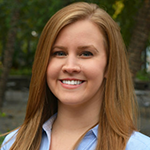Name: Brittany Shields
Education:
- MA Clinical and Counselling Psychology, University of Toronto
- BA Honours Psychology (Major) and Sexuality, Marriage and Family Studies (Minor), Coop Program, University of Waterloo
Current Job: Career Counsellor & Registered Psychotherapist (Qualifying) at Canada Career Counselling
-
When you were younger, what did you want to be when you grew up?
I’ve had a few different ideas through the years, first was ballerina, then through elementary school I considered teacher, lawyer (after watching the movie Legally Blonde) and x-ray technician (an idea from my cousin that quickly changed after Grade 10 when I realized I didn’t love science). In high school I took the course Psychology, Sociology, Anthropology – absolutely loved it and after taking a gap year decided to pursue a BA in Psychology.
-
How did you become interested in career development?
When I was in my BA I was originally interested in becoming a psychologist who focused on relationship counselling, so for my BA thesis I worked with a professor who researched relationships, she gave me a project to work on, on work-life balance and relationship outcomes. To my surprise, I ended up really liking the work-life balance component. Around this time, I also was also taking a career course, which was very helpful for me as I was deciding next steps after my BA. I first applied to clinical counselling programs with a focus on relationship research but was not accepted. While having a year to rethink graduate programs I realized career counselling would be an excellent fit for me as I like counselling that is structured and tangible. I grappled with pursuing career counselling for a while because I felt like career counselling was less esteemed/respected/competitive than clinical counselling, however, after talking with a friend in my Psychology program I respect and admired she helped me revaluate this message.
The combination of all these events lead me to pursue an MA degree (as I wanted a program which would provide me with the potential to become a psychologist and do research/receive research funding) and a research supervisor who focused on career difficulties and specifically work-life balance. I found D. Charles Chen at U of T and he accepted me to the MA program. Since then I have graduated, and I am working as a Career Counsellor/Registered Psychotherapist (Qualifying) under the supervision of a Registered Psychologist. For the future, I am also considering becoming a psychologist that focuses on career difficulties. I am very happy with the outcome of this trajectory.
-
What are you doing now that you’re done school?
I am working as a Career Counsellor at Canada Career Counselling where I focus on counselling clients with career related difficulties. I am also a Registered Psychotherapist (Qualifying) and I am considering working toward becoming a psychologist in the future.
-
Looking back, how did being a member of GSEP help enhance your current career?
GSEP has helped enhance my current career by supporting my research interests and disseminating my ideas on their website. For instance, a summary of my research is on the GSEP Corner, a place where graduate students can write blogs.
GSEP also provided me with the opportunity to attend Cannexus through their GSEP Award. Attending this conference was such a great experience! It provided me an opportunity to a) present my MA Thesis Delayed Gratification: A Double-edged Sword? A Study on the Relationship between Delayed Gratification, Work-life Conflict and Career Burnout b) attend a breakfast specifically with other graduate students who have similar research interests as me, c) network with other career professionals and d) learn from other presentations about career theory, research and application. Thanks GSEP!
-
What is something surprising you’ve learned since getting into the career development field?
The thing that has surprised me the most since getting into the career development field is the connection between career counselling and mental health. When I first started my BA in Psychology, I didn’t automatically see this connection, in fact, I originally thought career services was only for receiving resume/cover letter/coop help. However, after taking a great course on Career Development at University of Waterloo, completing my MA and becoming a Career Counsellor/Psychotherapist Q, I see all the mental health benefits that career counselling provides, specifically self-understanding, self-acceptance and stress reduction.

